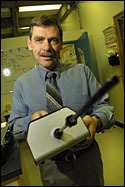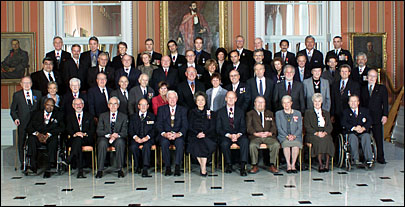Kaleidoscope
Wayne Wood: E to the power of two
 PHOTO: Owen Egan
PHOTO: Owen Egan |
|
When Wayne Wood takes you on a tour of the Environmental Safety Office he shows you the large meeting room where courses are taught on such topics as first aid, radiation safety or handling asbestos. Then he'll show you the big machine used to calibrate Geiger counters in the dry laboratory -- dry because only dry substances are analyzed, like the dust samples taken from areas where radiative materials are used.
"We're one of only two places in eastern Canada accredited to calibrate Geiger counters," says Wood, an occupational health specialist and manager of McGill's Environmental Safety Office.
Continuing the tour in the spacious quarters on the top floor of Chancellor Day Hall, he opens a large cabinet full of meters used to measure all sorts of potentially hazardous substances in the workplace: radiation, carbon dioxide and fungal spores, to name a few.
"Here we have a radon meter, good for checking if radon gas is leaking from the earth into a basement," says Wood. "It's used especially in the University's houses where naturally occurring radon can be dangerous for the occupants."
Clearly Wood is proud of the services he and his staff of 11 offer to assure both staff and students that the University is a safe place to work. "I wouldn't say that this is a dangerous environment but there are many interesting environments to be managed."
Wood ought to know. Since his first days at McGill 16 years ago when he was hired as the sole environmental safety officer, he has seen his share of challenges. "I enjoy emergencies," he says, going on to describe his "favourite project" -- decomissioning the McGill cyclotron in 1993.
"That was a 400 to 500 ton nuclear reactor used by Physics to make isotopes (radioactive elements). Our job was to separate out the radioactive waste and remove the reactor. The magnet itself was the size of this room, about 30 by 40 feet. The whole job took 12 weeks."
Back on the tour, Wood moves into the staff kitchen and takes out a blue plastic box from a cupboard. No, this isn't a recycling box, nor is it related to environmental safety -- at least, not strictly speaking. But it does relate to Wood's other passion in life, the natural environment.
A vermiculture composter, the box is symbolic both of Wood's longtime dedication to treading lightly on our earth and of the happy convergence between the two types of environmental safety in his life. Amidst the vegetable scraps and shredded paper, you can barely see the red worms at work producing the dark earth.
"Everyone here contributes," he says, "except Joe [Vincelli, the radiation safety officer]. He takes his scraps home to his own compost!"
Wood has worked with students and the residences, getting the composters into place to lesson the burden on the environment made by the University. As vice-chair of the Senate Sub-Committee on the Environment, he's soon to hire an environmental officer to oversee the implementation of the University's policy on the environment.
It's extra work that Wood, outdoorsman, cyclist and bird-watcher, is thrilled to take on. Pulling out a McGill "Rethink, reduce, reuse, recycle" T-shirt, he says he can't quite get over the fact that "for the first time in my career, I've had my own group of activists working for me. How many administrators have students lobbying for them?"
Wood's referring to the students he helps and who help him when it comes to environmental projects. How-Sen Chong, for instance, member of the senate sub-committee and a U3 Student in political science and the McGill School of Environment, was hired by Wood two summers ago to work on McGill's environmental review and they've been in touch ever since. Wood knows Chong's number by heart.
"I'm a student activist and Wayne was very helpful in explaining the administration's position on different things. He also has a good knowledge of the history of activism at McGill," notes Chong, recounting how when students went to Wood with the idea of having double-sided photocopying, Wood had some background on the question. "He told us that, in fact, the service was already there but isn't widely used because the machines jammed a lot."
Wood, for his part, finds it "a great pleasure to help the students navigate the system. They're great to deal with because they're not just here to grab a diploma and run."
Working with students, doing work that is rarely predictable, and being able to effect change at the university makes for a pretty good job, in Wood's estimation.
"I rejoice for the fact that I'm in a position to effect change. Not only can I live in an environmental way personally, but I'm part of an organization dedicated to operating environmentally. That's a real privilege."
 |
||||
|
Men tend to direct the sexual script, meaning that men are much more instrumental in directing things. There has been a lot of pressure on men now to make sure that their partner is pleased, and it may be that men are very concerned with taking their partners' needs into account -- which would be great. |
||||
Jubilee lunch with the Queen

Canadian Governor General Adrienne Clarkson and her consort John Ralston Saul hosted a luncheon for the Queen of England and the Duke of Edinburgh October 14. Not only did they provide her majesty with typically national victuals, but also with good Canadian companionship, including two McGill professors.
Invitee emeritus law professor Paul-Andre Crepeau says, "The idea was to have one Canadian to represent each year of the 50 jubilee. My year was 1991, the year the Civil Code of Quebec was adopted." MUHC's Phil Gold stood in for 1968, the year he and Sam Freedman discovered the antigen most frequently used in diagnosis and treatment of cancer patients.
1952 was done proud by film and TV producer/director Norman Jewison, being the year he joined CBC. And 2002 went to Lieutenant-Colonel Pat Stogran, who commanded the Third Battalion, Princess Patricia's Canadian Light Infantry in Afghanistan this year.
The years in between were represented by Canadians as various as astronaut Roberta Bondar, Olympic gold medallist Nancy Greene, film director Atom Egoyan, writer Margaret Atwood and songster Stompin' Tom Connors.
The Queen and Duke greeted each guest personally. "To me it was a very thoughtful gesture to stop and talk to each of the 50 Canadians," Crepeau said, "She seemed so at ease and had a casual, friendly attitude."
Gold had thought he'd be one "of a cast of thousands." When he received an email from a colleague two days before the event congratulating him on his inclusion, the weight of the event hit him "I said 'oh my god, I've got to get a haircut.'"
Gold enjoyed the event immensely thanks to the "terrifically eclectic nature of the gathering."
"Farley Mowat kept the place in stitches," Gold said, also pleased he was "able to tell [quarterback for the Rough Riders, 1958-69] Russ Jackson I booed him roundly when he scored against the Allouettes!" He met General Romeo Dallaire, "a remarkable fellow who always stood up for what he thought was right."
Crepeau was delighted to meet Mr. 1960, Paul Gerain-Lajoie, the first education minister of Quebec. "It was a wonderful occasion to see people you've heard of, read of in newspapers, and suddenly they become reality."
Guests feasted on Quebec foie gras and butternut squash cannelloni filled with a tarragon-scented polenta and roulade of Southern Haida Gwaii spotted prawns among other national delectables.
"It was done simply, but the protocol was not 'stuffy,'" Crepeau says. "It was one of those events in one's life that doesn't come often." To sum up how he felt, he recounted the tale of the opening of Chateau Versailles at which King Louis XIV asked a guest what was he most impressed by at the event. The fellow replied 'That I had been invited!'"
 |
||||
|
I wanted a place that had made those '70s institutional concessions to an exploding student body. There was another allure, he added: |
||||

